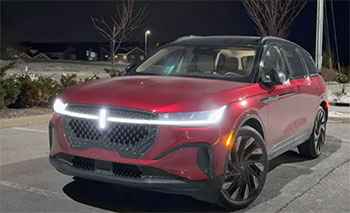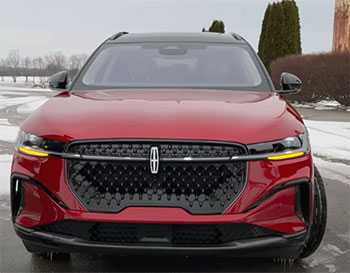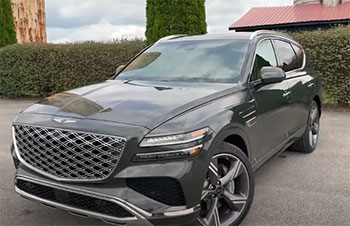I’ve always been drawn to luxury SUVs for their blend of style, comfort, and performance—a trifecta that turns every drive into an experience. When I set out to compare the 2025 Lincoln Nautilus and the 2025 Genesis GV80, I wasn’t just crunching numbers; I was chasing the feeling of finding the perfect ride.
My mission here is to share my hands-on journey with these midsize luxury crossovers, weighing their strengths and weaknesses to help you pick the one that fits your life. From cutting-edge tech to plush interiors, I’ll guide you through what makes each SUV shine.
Comparison Table: Lincoln Nautilus vs. Genesis GV80
| Feature | Lincoln Nautilus (2025) | Genesis GV80 (2025) |
|---|---|---|
| Starting MSRP | $52,000 | $58,200 |
| Base Engine | 2.0L Turbo 4-cylinder (250 hp) | 2.5L Turbo 4-cylinder (300 hp) |
| Optional Engine | 2.0L Turbo Hybrid (310 hp) | 3.5L Twin-Turbo V6 (375 hp) |
| Fuel Economy (City/Hwy) | 21/29 mpg (base), ~30 mpg (hybrid) | 20/24 mpg (base), 18/23 mpg (V6) |
| Cargo Space (Behind 2nd Row) | 36.4 cu. ft. | 34.9 cu. ft. |
| Max Cargo Space | 71.3 cu. ft. | 84 cu. ft. |
| Infotainment Screen | 48-inch panoramic + 11.1-inch touchscreen | 27-inch OLED touchscreen |
| Safety Rating | 5/5 NHTSA, IIHS not fully evaluated | 5/5 NHTSA, IIHS Top Safety Pick+ (post-Aug 2023) |
| Warranty | 4-yr/50,000-mile basic, 6-yr/70,000-mile powertrain | 5-yr/60,000-mile basic, 10-yr/100,000-mile powertrain |
| Key Features | BlueCruise hands-free driving, Digital Scent | Remote Smart Parking Assist, Ergo Motion seats |
My Experience With the Lincoln Nautilus

The moment I settled into the 2025 Lincoln Nautilus, I knew I was in for something special.
The cabin felt like a high-end lounge, with soft leather seats and a 48-inch panoramic display that stretched across the dashboard like a futuristic command center.
In the Black Label trim, the Allura Blue upholstery and open-pore wood accents gave off a vibe that was both modern and timeless, making me want to find excuses to stay behind the wheel.
Whether I was running errands or embarking on a weekend road trip, the Nautilus felt like a retreat on wheels.
I tested both powertrains: the standard 2.0-liter turbocharged four-cylinder (250 horsepower) and the hybrid (310 horsepower). The base engine was smooth for daily driving, but it lacked the punch I craved when merging onto highways or tackling steep inclines.
The hybrid, paired with a continuously variable transmission (CVT), delivered a noticeable boost in power and efficiency, hitting around 30 mpg in my mixed city and highway drives. That efficiency was a game-changer for my wallet, especially with gas prices creeping up. The ride quality was a highlight—plush and composed, the Nautilus soaked up potholes and rough pavement like a luxury sedan, making it ideal for long commutes or family road trips.
The tech suite was where the Nautilus really flexed its muscles. Lincoln’s BlueCruise hands-free driving system, included for four years, was a revelation on a 200-mile highway stretch. I activated it, and the SUV handled steering, braking, and acceleration with eerie precision, letting me relax while keeping my hands lightly on the wheel for safety.
The Lincoln Rejuvenate feature, which combines ambient lighting, seat massages, and calming visuals, felt like a mini-spa session during a traffic jam. I even experimented with the Digital Scent system, which lets you choose fragrances like Mystic Forest or Ozonic Stream to fill the cabin. It’s a quirky touch, but it added a layer of personalization that made the Nautilus feel uniquely mine.
That said, the Nautilus had its quirks. The base engine felt underpowered compared to rivals, especially when I pushed it during a spirited drive through winding backroads. The CVT in the hybrid, while efficient, dulled the acceleration, making it less engaging than I’d hoped.
The massive infotainment screen, while gorgeous, occasionally lagged when I switched between navigation and music apps, which was frustrating in such a tech-heavy vehicle. Cargo space (36.4 cubic feet behind the second row, 71.3 max) was decent but trailed competitors like the GV80, and the lack of a third-row option could be a dealbreaker for larger families. Still, the Nautilus’s blend of comfort and tech made every drive feel like an event.
Pros of the Lincoln Nautilus

- Serene Ride Quality: The Nautilus glides over bumps and potholes with a softness that rivals pricier SUVs, thanks to its adaptive suspension on higher trims.
- Futuristic Panoramic Display: The 48-inch screen is a visual masterpiece, delivering crisp navigation, vehicle stats, and media with wireless Apple CarPlay and Android Auto.
- BlueCruise Hands-Free Driving: This system transforms highway drives, handling steering and speed with confidence, free for four years on compatible roads.
- Hybrid Fuel Efficiency: The hybrid powertrain’s ~30 mpg makes it a practical choice for daily commutes, saving money without sacrificing performance.
- Opulent Interior Design: From 24-way Perfect Position seats with massage to crystal-inspired controls, the cabin feels like a five-star hotel.
- Unique Digital Scent: Customizable cabin fragrances add a personal touch, setting the Nautilus apart in a sea of luxury SUVs.
- Affordable Starting Price: At $52,000, it undercuts the GV80 by $6,000, offering premium features at a more accessible price point.
- Revel Audio System: The available 28-speaker system delivers concert-quality sound, making every playlist feel immersive.
- Generous Maintenance Package: Four years/50,000 miles of complimentary maintenance beats the GV80’s three-year plan, adding long-term value.
The Nautilus’s ride quality is its secret weapon. Whether I was navigating city streets or cruising down a bumpy rural road, the suspension ironed out imperfections, creating a serene experience that made long drives a breeze. That 48-inch display wasn’t just eye candy—it was intuitive, letting me customize layouts to prioritize navigation or music. BlueCruise took the stress out of highway trips, and the hybrid’s efficiency meant fewer stops at the pump.
The interior’s attention to detail, from the buttery leather to the ambient lighting, made every journey feel indulgent. The Digital Scent feature was a quirky highlight—I loved switching to a calming fragrance after a long day. At $52,000, the Nautilus delivers luxury that feels like a steal, and the Revel audio system turned my favorite songs into a cinematic experience. The maintenance package sweetened the deal, ensuring peace of mind for years.
Read More: My Thoughts On Ford Escape Vs. Mazda CX-5
Cons of the Lincoln Nautilus
- Lackluster Base Engine: The 250-hp turbo four-cylinder feels sluggish during quick maneuvers, falling short of the GV80’s punchier base powertrain.
- CVT Dullness in Hybrid: The continuously variable transmission saps the fun from acceleration, making spirited drives less engaging.
- Infotainment Lag Issues: The 48-inch screen occasionally stutters when switching apps, which feels out of place in a tech-forward SUV.
- Limited Cargo Capacity: Maxing out at 71.3 cubic feet, the Nautilus trails the GV80’s 84 cubic feet, limiting its utility for big loads.
- No Third-Row Seating: Families needing extra seats will find the two-row-only Nautilus less versatile than competitors like the GV80.
- Inconsistent Brake Feel: The brake pedal’s nonlinear response makes smooth stops tricky, especially in stop-and-go traffic.
- Comfort-Over-Sport Handling: The Nautilus prioritizes plushness over agility, feeling less dynamic than the GV80 on twisty roads.
- Base Trim Sparsity: The entry-level model lacks some premium features like adaptive suspension, requiring upgrades to match the GV80’s standard kit.
- Resale Value Lag: Retaining 45.5% of its value after five years, the Nautilus slightly trails the GV80’s 47.5% resale performance.
The Nautilus’s base engine was a letdown when I needed quick acceleration, like merging onto a busy interstate—it just didn’t have the gusto I wanted. The hybrid’s CVT, while efficient, made the SUV feel less responsive, especially on winding roads where I craved a bit more thrill. The infotainment lag was a minor but noticeable annoyance, breaking the seamless experience I expected from such a high-tech cabin.
Cargo space was adequate for groceries or weekend bags but fell short for bigger hauls compared to the GV80. The lack of a third row was a bummer for friends with larger families, and the brakes’ inconsistent feel took some getting used to. The Nautilus’s comfort-first handling, while great for cruising, left me wanting more feedback during spirited drives. The base trim felt a bit bare-bones, and the resale value, while decent, didn’t quite match the GV80’s edge.
My Experience With the Genesis GV80

Climbing into the 2025 Genesis GV80 was like stepping into a private jet.
The cabin’s quilted Nappa leather, burled wood trim, and sleek 27-inch OLED touchscreen screamed sophistication, rivaling SUVs that cost twice as much.
The exterior’s bold crest grille and quad-lamp headlights turned heads at every stoplight, giving the GV80 a presence that felt both elegant and commanding.
Whether I was navigating city streets or hitting the open road, the GV80 made a statement.
I drove both engine options: the 2.5-liter turbo four-cylinder (300 horsepower) and the 3.5-liter twin-turbo V6 (375 horsepower). The base engine had plenty of pep for daily driving, but the V6 was a revelation, rocketing the GV80 to 60 mph in about 5.7 seconds during my test drives.
Paired with an eight-speed automatic, the V6 delivered smooth, effortless power, making passing maneuvers a breeze. The GV80’s handling struck a perfect balance—composed enough for comfort but agile enough to tackle winding roads with confidence. It wasn’t as pillow-soft as the Nautilus over rough pavement, but it felt more planted during spirited drives.
The GV80’s tech was a standout. The 27-inch OLED display was sharp and responsive, and the dial-based controller became second nature after a few hours. Remote Smart Parking Assist was a game-changer in tight urban lots—I watched in awe as the SUV parked itself flawlessly.
The Ergo Motion seats, with 18-way adjustments and massage functions, were a godsend on a three-hour drive, though they didn’t quite match the Nautilus’s 24-way customization. The safety suite, earning a 2024 IIHS Top Safety Pick+ rating (post-August 2023), included unique features like a front seat center airbag and Downhill Brake Control, giving me confidence in tricky conditions.
But the GV80 wasn’t perfect. Its fuel economy—20/24 mpg for the base engine and 18/23 mpg for the V6—lagged behind the Nautilus, especially the hybrid. The $58,200 starting price and premium fuel requirement added up quickly, and the optional third row, while a nice touch, was too cramped for adults. The ride could feel harsh over potholes, and the infotainment dial took some getting used to. Still, the GV80’s blend of power, luxury, and tech made it a formidable contender.
Pros of the Genesis GV80
- Potent Engine Lineup: The 300-hp base engine and 375-hp V6 deliver thrilling acceleration, with the V6 outpacing the Nautilus with ease.
- Opulent Interior Craftsmanship: Quilted Nappa leather and wood trim create a cabin that rivals six-figure SUVs, elevating every drive.
- Top-Tier Safety Ratings: The 2024 IIHS Top Safety Pick+ (post-August 2023) includes features like a front seat center airbag for added peace of mind.
- Expansive Cargo Space: With 84 cubic feet max, the GV80 beats the Nautilus for hauling luggage, gear, or shopping hauls.
- Cutting-Edge Technology: The 27-inch OLED display, Remote Smart Parking Assist, and 21-speaker Bang & Olufsen audio system feel futuristic.
- Industry-Leading Warranty: A 5-year/60,000-mile basic and 10-year/100,000-mile powertrain warranty offer unmatched long-term assurance.
- Dynamic Handling Balance: The GV80 combines comfort and agility, making it a joy on winding roads while still cruising smoothly.
- Third-Row Option: The available third row, though tight, adds versatility for families with young kids, unlike the Nautilus.
- Strong Resale Value: Retaining 47.5% of its value after five years, the GV80 slightly edges out the Nautilus in long-term value.
The GV80’s powertrains were a highlight—both engines delivered confident performance, but the V6’s surge of power made every drive exhilarating. The interior felt like a bespoke luxury suite, with materials that rivaled brands like Mercedes-Benz. The safety features, especially the center airbag, gave me extra confidence when driving with passengers. Cargo space was a lifesaver during a weekend getaway, easily fitting luggage, coolers, and more.
The tech suite, from the self-parking feature to the crystal-clear Bang & Olufsen audio, made every journey feel high-end. The warranty coverage is a major perk, promising years of worry-free ownership. The GV80’s handling struck a sweet spot, letting me enjoy both relaxed cruises and spirited drives. The third-row option, while not ideal for adults, added flexibility for families.
Cons of the Genesis GV80
- Premium Price Tag: Starting at $58,200, the GV80 is pricier than the Nautilus, with top trims like the 3.5T Prestige hitting $79,000.
- Subpar Fuel Economy: The base engine’s 20/24 mpg and V6’s 18/23 mpg lag behind the Nautilus, especially the hybrid’s ~30 mpg.
- Premium Fuel Costs: Both engines require premium gas, adding roughly 82 cents per gallon compared to the Nautilus’s regular unleaded.
- Cramped Third Row: The optional third row is tight, best for kids, limiting its appeal for families needing full-size seating.
- Harsh Ride on Rough Roads: The suspension transmits more vibrations over potholes than the Nautilus, reducing comfort on bad pavement.
- Infotainment Learning Curve: The dial-based controls and far-reaching touchscreen take time to master, unlike the Nautilus’s more intuitive setup.
- Shorter Maintenance Plan: Three years/36,000 miles of complimentary maintenance trails Lincoln’s four-year/50,000-mile package.
- Limited Color Options: The GV80’s exterior palette feels conservative compared to the Nautilus’s bolder choices like Allura Blue.
- Heavy Curb Weight: At over 4,800 pounds (V6 model), the GV80 feels heftier than the Nautilus, impacting agility and efficiency.
The GV80’s higher price was hard to ignore, especially when factoring in premium fuel and poor mileage—my wallet felt the pinch after a week of driving. The third row, while a nice option, was too small for my taller friends, making it less practical than expected.
The ride quality suffered on rough city streets, with more bumps filtering through than in the Nautilus. The infotainment dial was innovative but took a day or two to feel natural, and the touchscreen’s placement felt just out of reach. The maintenance plan was less generous than Lincoln’s, and the color options felt safe compared to the Nautilus’s flair. The GV80’s weight made it feel less nimble in tight corners, despite its sporty edge.
Read More: My Thoughts On Acura MDX Vs. Volvo XC90
Frequently Asked Questions (FAQ)
The Lincoln Nautilus is comparable to midsize luxury SUVs like the Genesis GV80, Lexus RX, Cadillac Lyriq, and Acura MDX, offering similar luxury, tech, and performance.
Yes, the Genesis GV80 retains 47.5% of its value after five years, slightly better than the Nautilus’s 45.5%, giving it a slight edge in resale value.
No, Lincoln is not phasing out the Nautilus. The 2025 model is a recent redesign, signaling continued investment in this SUV.
The Lincoln Nautilus has average reliability, with fewer projected recalls than some rivals, but specific long-term data for the 2025 model is limited.
Conclusion: For the Lincoln Nautilus and Genesis GV80
You’re standing at a crossroads, and I’ve walked that path. The 2025 Lincoln Nautilus and Genesis GV80 are both stellar luxury SUVs, but they cater to different desires. If you want a serene, tech-packed ride with better fuel economy and a lower price, the Nautilus is your sanctuary. Its BlueCruise, hybrid efficiency, and spa-like features like Lincoln Rejuvenate make every drive feel indulgent. But if you crave raw power, a sportier edge, and a cabin that rivals the elite, the GV80 delivers with its V6 muscle, top safety ratings, and cavernous cargo space. Your choice depends on what moves you—comfort or exhilaration. Pick the one that feels like home.

